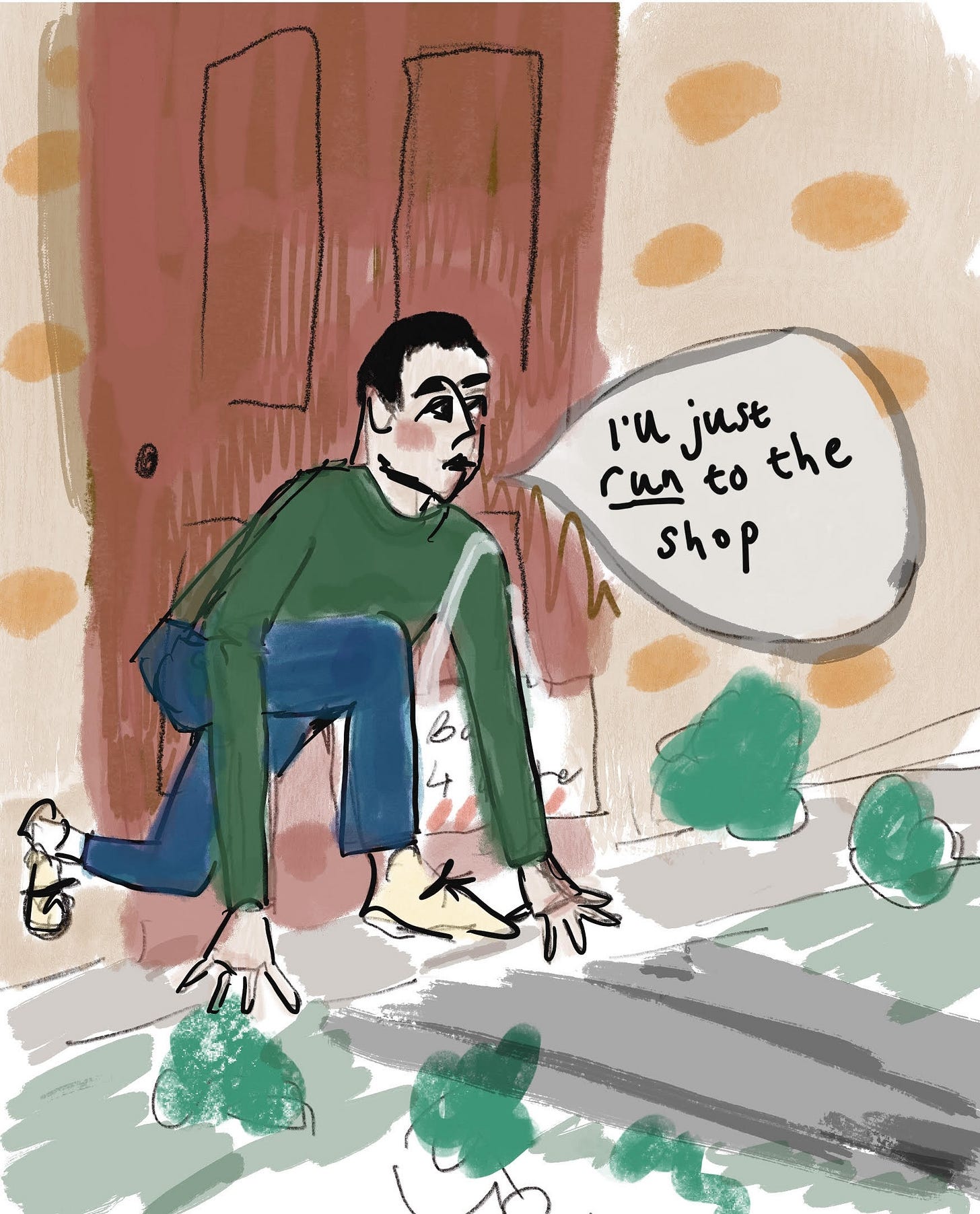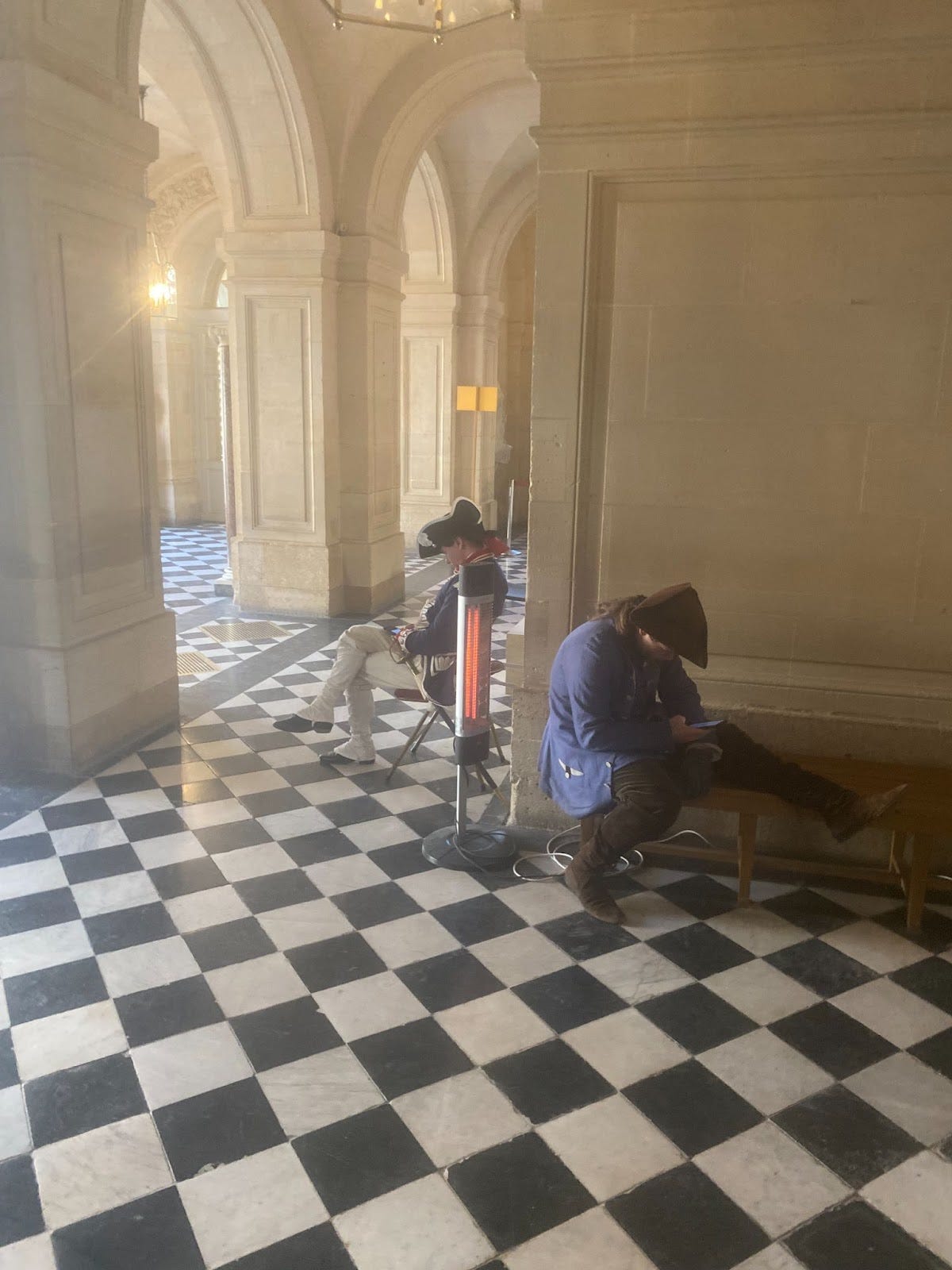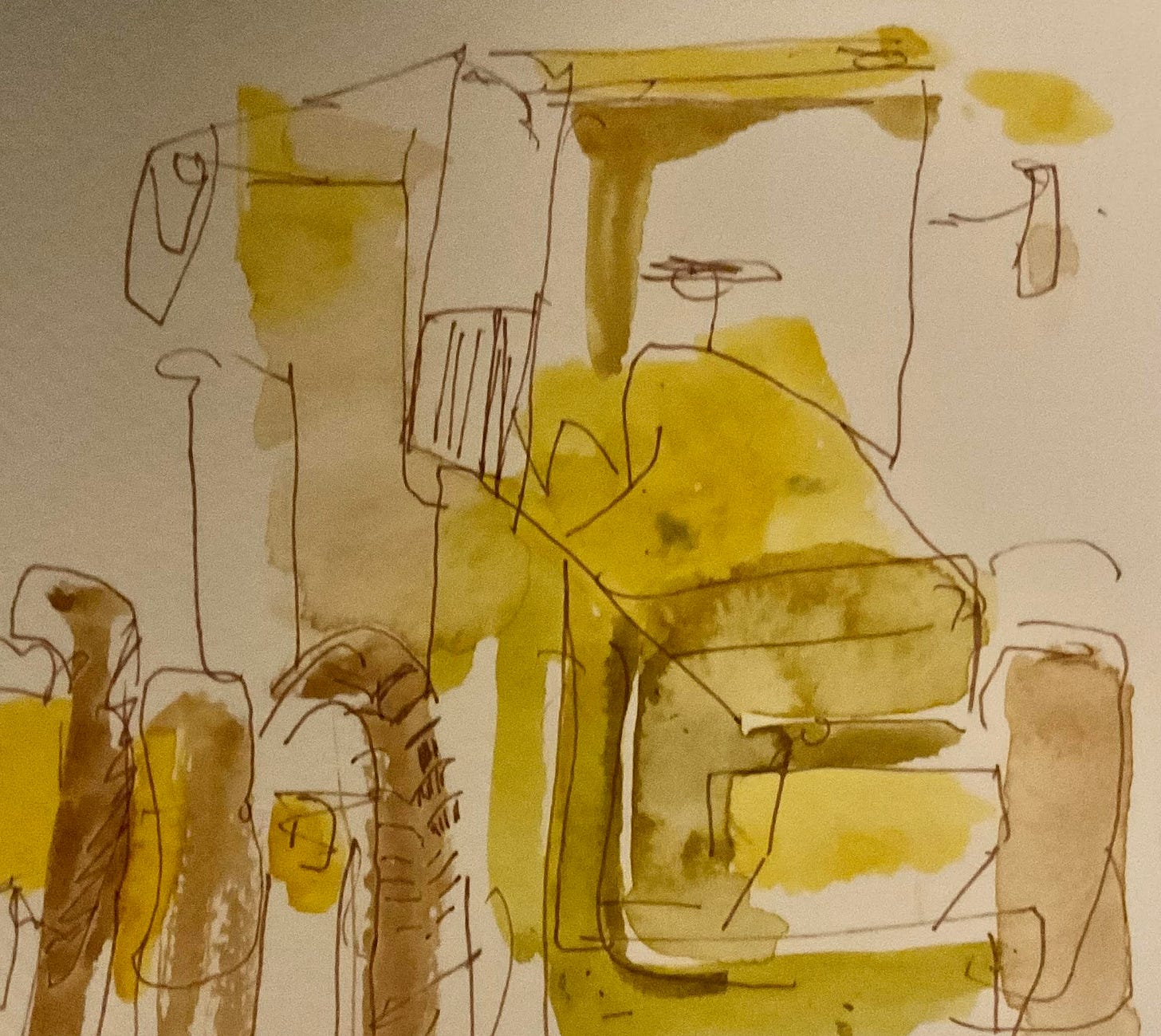Dear Friend,
How are you doing? I hope you’ve had a good few days since I last wrote.
If you read my last letter, you will have looked at my glossary of Britishisms, turns of phrase we only use in the UK as part of our awkward struggle to never appear rude, bored or like we disagree – a tricky task for a human being! Now that I have shared the list, I think I can consider it officially peer-reviewed, especially as some most esteemed thinkers corroborated my analysis.
British illustrator, author and comics-maker
said:“I love the British euphemisms list!! I use “bung” [a word the British use to avoid the frightening directness of using the verb ‘put’] all the time. And it never occurred to me to think about why we use these words, I think you’re so right! But although I really enjoy the directness found in some other cultures I don’t think I could change over.”
British journalist and writer
said:“Your vocab list is perfect. I too often announce "I'm desperate for a wee!" before scuttling to the toilet in a manner that suggests imminent disaster, even if the truth is that I'm at least an hour away from that being a concern. I didn't realise until today that it's because I'm trying to be polite.”
Friend of Pen Friend and clever fellow, alias Judge Roy Bean, unlike the above two readers, is an American. He said:
“‘FAFFING AROUND’…now that’s a keeper!”.
My uncle also pointed out to me that “faffing” exists in noun form too, with a slightly different meaning. A faff (n) e.g. ‘this paperwork is a bit of a faff’ – designates something fiddly and annoying, onerous. And of course it understates just how annoying the thing is. I tried to think of what a French person might say in an equivalent situation and landed on – “une catastrophe”.
Can you think of any more Britishisms that my people use to help attenuate our constant low-level anxiety? Do let me know by writing back.
Back to the future
It’s less than six months now until Paris hosts the Olympic Games. Many Parisians have already planned their escape, both because they think it will be hellish to be in Paris with all the activity and also because people stand to make a small fortune by letting out their homes — but I, for one, plan to be in town and I am starting to get excited about it.
Earlier in the week, I went to a pre-Olympics press showcase, organised by the city of Paris, aimed at displaying what will be on offer for tourists in and around the events. The first part of the event was at the Château of Versailles, where the equestrian events will be held this summer. Competitions like show-jumping and dressage will be held in the vast gardens of the former palace, at the end of the cross-shaped Grand Canal, which Louis XIV had built as the focal point of the ornate Grand Perspective, composed of parterres, groves and geometrically arranged trees.
We went on a Monday, when the château is closed to the public (bragging) and we shared the near-empty palce with the cast and crew of the second series of Marie Antoinette, a co-production between the BBC and French television channel Canal+. This led to some delightfully contrasting scenes, such as the one below.
The next day I went to a pop-up museum located under the parvis (huge plaza) in front of Notre-Dame Cathedral. A small exhibit called 'Notre-Dame de Paris: at the heart of the construction site' tells the story of the reconstruction after the dramatic 2019 fire that destroyed the spire and ripped through the iconic structure. The exhibit outlines the scale of work involved in cleaning and painfully restoring the cathedral in the five-year time frame set out by President Macron, which would see the cathedral reopen to the public at the end of 2024 (not quite in time for the Olympics).
The first two years of the restoration were spent making the site safe to work in by cleaning all the ash, stabilising the structure, building scaffold and so on. Specialist craftspeople including stone masons and stained glass restorers, as well as engineers, architects, historians etc. were mobilised around the country working both onsite and offsite to research, make and restore the pieces. There are still a reported 1000 people working on the project as it enters the final phase.
The same subterranean space hosts ‘Eternelle Notre-Dame’, a state-of-the-art VR experience that lasts 45 minutes and takes the visitor through an immersive history of the cathedral, from its construction in the 12th and 13th century to the present-day reconstruction. The production is funded by telecom giant Orange, one of my many big corporate donors who paid into the cathedral’s restoration, including multi-billion-dollar luxury conglomerates Kering and LVMH. The VR experience itself costs 30 euros, of which about a third goes to the renovation.
Now, anyone who reads these letters closely will know that my natural inclination when it comes to technological development skews more Luddite than Silicon Valley, but even I have to say that I found the experience to be rather magical. As the tour begins I was welcomed by a hologram-man of above-average attractiveness, who introduces himself as a an 800-year-old/timeless builder of Notre-Dame.
My bearded hologram friend then took me on a journey through the cathedral’s history starting in Medieval Paris. I went ‘up’ with him on a wooden lift and looked out at the landscape as it was then — a cluster of higgledy piggledy timber-framed houses, giving way to green fields and hills (today’s Montmartre and Belleville). As the adventure continued, I really did feel like I was actually moving up, down and across the cathedral. It’s a very strange exercise in perception ; at one point when I was at the top of the virtual Notre-Dame, I almost reached into my pocket to get my phone in order to take a picture of the view, before remembering the view wasn’t really there.
Tractors speak louder than words
The farmers’ unions behind last week’s dramatic protests, which saw agricultural workers block major motorways with tractors, have stood down after prime minister Gabriel Attal came back with appeasing measures. These include 150-million euros of additional funding and the stricter application of the Loi Egalim, a law designed to help producers get a fair and fixed price for their products, which cannot be lower than the production costs. The Government has also pledged to write “food sovereignty” into the law, to make it obligatory to put the origin country of food clearly, and to push back with in Europe against lab-grown meat; the prime minister has also agreed to withdraw the Ecophyto Plan, whose aim was to reduce the use of pesticides.
But the farmers are not the only ones who are unhappy with conditions. Almost 50 percent of the country’s teachers according to teaching unions – and around 20 percent according to the Government! – went on strike on Thursday, demanding better pay and conditions, while also expressing anger at their treatment from their employer, the French state.
The role of education minister has been held by three different people in the last 18 months, including now prime minister Gabriel Attal. The latest appointment in the role, Amélie Oudéa-Castéra, a former tennis player, was Minister of Sports, Olympic and Paralympic Games before the Education and Youth brief was causally added to her title last month. Teachers have expressed outrage that the schools portfolio has just been bunged in there with her existing jobs, especially in the year of the Olympic Games, when activity around the event is surely going to dominate.
After a few days on the job, Oudéa-Castéra responded to criticism about sending her own children to Stanislas, an elite Catholic school near Saint-Germain-des-Prés, by blaming staff shortages in the state school system. This did not land well with teachers who saw her statement as disrespectful and dishonest. Newspaper headline writers and union critics went wild with tennis puns: "It's a double fault to the minister!” etc.
The appointment of Oudéa-Castéra and her subsequent gaffes are seen by many teachers as emblematic of the attitude of the Government, which are perceived as caring more about messaging and ideology than the day-to-day concerns of teachers. The Government has recently spoken about reinforcing the teaching of the national anthem and even re-introducing national service. Then in a left-field move, the prime minister recently suggested that children get dedicated lessons in empathy, which baffled many struggling teachers.
FR: “On ne peut pas continuer à nous parler des uniformes et du service national universel quand l’école est en train de s'effondrer.”
EN: “They can’t keep talking to us about uniforms and national service when schools are falling apart.” — Speaking to Libération newspaper, Sophie Vénétitay, general secretary of the Snes-FSU teachers’ union.
Two measures, which would seem uncontroversial in the UK, have also attracted criticism from many teachers. First, a pilot to introduce school uniform to some state schools, and second the partial introduction of ‘groupes de niveau’ or ability-based streaming. The streaming in particular is seen to go against the values of republican education, of which a major feature is to give all children in the state system a single (secular) education syllabus. (Public universities also do not select based on attainment, requiring only that prospective students pass their baccalaureate.)
As far as I can tell, not much has followed from the Government by the way of promises or U-Turns for the teachers, in contrast to the reaction to the farmers’ action. In the same interview with Libération newspaper quoted above, the union leader Vénétitay describes her frustration at the contrast.
FR: “Ils ont été reçus tout de suite, des mesures ont été lâchées en vingt-quatre heures, on a l’impression que toutes les colères ne sont pas légitimes aux yeux de ce gouvernement. Des collègues me disent : ‘faut-il aller en tracteur rue de Grenelle?’”.
EN: “[The farmers’ unions] were received straight away, the measures [that they opposed] were dropped in 24 hours. We get the impression that not all kinds of anger are [equally] legitimate in the eyes of this Government. Colleagues say to me: ‘do we need to go in tractors to [the education ministry]?’”.
Thirty-second book club
I am still working my way through A Year in Provence by Peter Mayle and so far have noted that technology may have changed, but the rural France described in 1989 seems to still have a lot in common with the rural France of today.
Et voilà ! That’s all for today. Thank you for reading about Versailles, VR Notre-Dame and striking. Please go ahead and share and ‘like’ these letters if you enjoy them.
I hope you have a good week!
Yours,
Hannah









“Friend of Pen Friend and clever fellow, alias Judge Roy Bean…”
I’m honored! I don’t consider reading and commenting on this “clever” newsletter to be “faffing around!”
“And of course it understates just how annoying the thing is.”
In the States, that condition, “fiddly, annoying, onerous,” is a “shit-show.”
“Can you think of any more Britishisms that my people use to help attenuate our constant low-level anxiety?”
Most famous might be, “Keep calm and mind the queue.” How about “take a deep breath, make a wish and Bob’s your Uncle?” Or if a person is overly anxious, they might need to "Wind your neck in."
“VR guide man “Whoa!! That’s amazing!!
“But the farmers are not the only ones who are unhappy with conditions. Almost 50 percent of the country’s teachers according to teaching unions –“ Teachers are the most neglected and underappreciated profession out there.
“… ‘do we need to go in tractors to [the education ministry]?’” BRAVO!!!
As a 70 year old, having, at last, the solitude to reflect on the many happy memories in my life, I find that school uniforms, that the girls in my Catholic High School wore in the late 60’s and early 70’s, were actually very fetching; though we boys complained because the girls at the nearby Public High School wore miniskirts…at age 16 I thought no one looked cuter than my 1st girlfriend, also 16, looked in her uniform.
Hi Darling Hannah!
Brilliant and heartwarming read this week! So funny to think about our English euphemismsms in the attempt to avoid the actual word from percieved offence. ( I say English now as no self respecting Scot, Irish, or Welsh citizen of great Brittain would ever describe themselves as a " Brit " infact our " low level anxiety" as you so rightly described it even extends to pretty mech NEVER describing ourselves as " English " its become a very dirty post empirical word, but really amongst our guilty selves now the wide truth of our diabolical behaviour over the centuries has been brought to light .
However, the rest of the world doesnt appear to mind todays natives from our Isle half as much as we do! Infact my Scottish friends are quite the Anglophiles and Ive found delightful responses to being English in many places. Its the loud and wonderful American proclamation that I am " Oh Wow a BRIT!" That is the antithesis of lying low in a most appologetic manner and just about keeping my plummy / west country brogue at a barely audible volume.
Your list of our habit of replacing words with euphemisms got me thinking about the sometimes baffling language we have.
An example being when you wrote about " A pilot to introduce school uniforms" in France.
I wondered " Why a Pilot? ... well I suppose Pilots wear very smart uniforms and it may sell the idea to the children!)
Ahhh the nuances of grammar eh? Lovely read Hannah .Top notch old bean!❤️🤗